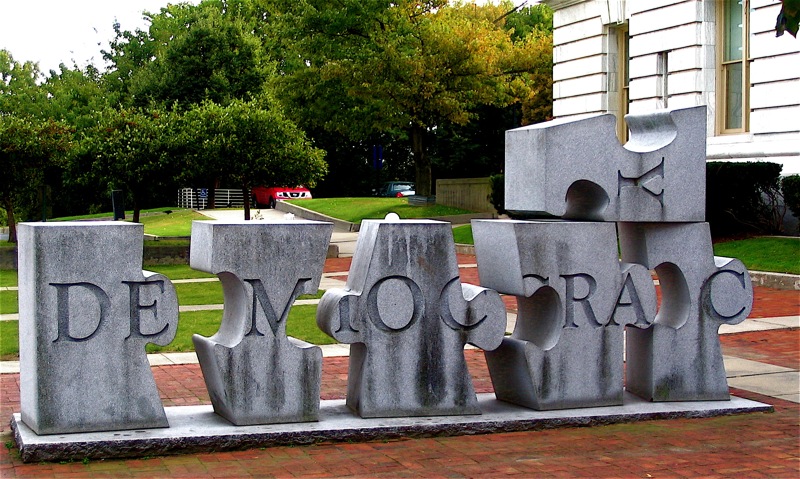Political engagement: what have we learnt?

- Part of Bright Green’s new political engagement series
For the last few weeks Bright Green has been publishing a series of articles on political engagement, exploring how its changing, what might be driving these changes and how it might be improved. This is partly out of a recognition that political engagement often doesn’t get the attention that it deserves: empty platitudes around election time are often the best we can hope for. Yet, in the words of the article that started this series: “We face huge, existential threats, and the only way to solve them is by having an active and engaged citizenry ready to challenge corruption and complacency. It is the duty of all of those involved in politics to be constantly asking ‘where are we failing?’ and ‘how can we do better?’”
So, 8 articles later, what have we learnt? We’ve seen some of the twists and turns in political engagement and contextualised where it is we are today; seeing how voting, trade union action and political party membership have all declined (except for a spike in recent months for Labour and fringe parties), how informal protests are at a 40-year high, and how new technologies like social media are offering new ways of engaging in politics.
Beyond this though, we’ve some potential remedies to the negative trends too. Using the language of my earlier piece that focused on the social science research behind engagement, we’ve seen a lot of suggestions for how to improve both internal and external ‘political efficacy’, the sense that we have the ability and skills to act in the political world and the sense that the political system will respond to our actions, key psychological mechanisms behind political engagement.
We’ve heard, from Arte, how performance theatre can be used to engage individuals in politics in a unique way, breaking down barriers and opening doors to new ways of thinking and ‘playing’ with politics. So too, have we heard, from Alex, how online forms of participation can empower individuals, with him suggesting that “digital democracy can be the leveller, there are far fewer barriers involved with internet campaigning than there are with the traditional mediums.” This ties in with some of the evidence in the article that kicked all of this off that suggests social media has been used as an organising tool in revolutions and protests spanning the globe. The impact institutions have on our psychology has been questioned too, such as the the media and educational systems often failing to provide a sense of active and informed citizenship.
These highlight ways in which ordinary citizens can be empowered, exploring how, through different approaches or technologies, internal political efficacy can be raised for these individual’s. By lowering the initial barriers to participation, we can give citizens an opportunity to engage and thereby boost their confidence and skills. In short, there are tangible ways we can make people feel like they can make a difference.
Feeling like you personally have the ability to make some sort of change isn’t enough though: people need to feel like the system will respond to these actions too. To this end, remedies for low external efficacy have also been offered. There have been suggestions for political parties, with writers in this series arguing that they can change their behaviour in order to better connect with citizens, ranging from embracing the benefits of digital democracy in both their campaigning and their internal functioning, to making a cultural shift away from “tribal party politics”. We’ve even heard, from Sam Brooke, of how “calamity and injustice can bring us together” highlighting the positive role political parties can play in shaping the narrative and fostering unity and hope in times of political turmoil, like Brexit.
Beyond this, on the macro-level, we’ve seen calls for real electoral and cultural shifts in how politics functions. We’ve seen calls for citizens’ assemblies and proportional representation, as well as the lowering of the voting age, reform of the House of Lords, ‘democratising devolution’ and a ‘registration revolution’.
A coherent direction emerges out of these suggestions and insights. It involves major political institutions being redesigned to be far more responsive to bottom-up pressure, and more open to direct, individual inputs. Along with this is a vision for a cultural shift in how the media, our education system and political parties talk and act, shifting to a more encouraging and empowering role than they often play today. Finally, new technologies and research need to be utilised in order to make the former two points happen. Political scientists often talk of the ‘third wave’ of democratisation that started in the mid 1970’s and saw large parts of south-east Asia and Latin America take on democratic institutions. Perhaps the fourth wave will not be in democracy conquering new geographical frontiers, but instead in modernising and revitalising the ones it has already taken root in.
What we’ve seen is this series is, ultimately, a vision for what our democracy could be. It’s provided a road map for some real, tangible changes, many of which are morally good in and of themselves as well as helping to improve political engagement. This conversation shouldn’t end here though: it should be transformed into real action and progress. At a time of such political, social and environmental upheaval, those movements that wish to make a change need desperately to be engaging a wider audience, growing from the bottom up. The only way to challenge the corruption and complacency that is at the heart of the problems we face once and for all is through a groundswell in grassroots engagement with politics: crafting a political system that at all levels is accessible and engaging and empowering. From the Prime Minister to the local activist, we all need to share a role in making this a reality.
So what does the future hold for political engagement? Well, that’s really up to you.




Leave a Reply